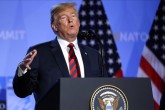Relations between the U.S. and Turkey have hit a critical juncture. I don’t know how many times it has been written in the last few years that relations are now at a critical point, but today that statement has never been truer.
For the last few years, the number of problems that occurred between the two countries increased dramatically. From the U.S.’ assistance for the People’s Protection Units (YPG) in Syria to its unsympathetic attitude during the coup attempt in Turkey, from the arrest of the deputy CEO of a Turkish bank in New York to the lack of substantial steps to keep promises in eastern Syria, the two countries have faced significant challenges in their relations.
All these challenges have generated a significant degree of lost trust between them. For years now, Turkey has tried to keep the spirit of an alliance and the strategic partnership alive. It has reached a point that Turkey is trying to pursue a working relationship not with the support of the U.S. but despite all the insensitive and uncaring foreign policy choices of Washington.
For Turkey, Washington’s support for a group recognized as a terrorist organization was an unforgettable betrayal in the spirit of an alliance. In the aftermath of the coup attempt, there were no efforts in Washington to contribute to the security of the democratically elected government in Turkey. In the meantime, ignoring the trauma of the Turkish public, U.S. Congress wrote letters and some congressmen introduced bills criticizing Turkey.
When Turkey signed the deal to buy the S-400 air defense systems from Russia, another chapter was opened in the long list of unresolved problems. Once again, Turkey tried to explain the reason of this purchase.
In the last several crises, it was Turkey that tried to explain its point of view to different U.S. administrations. It was wrong to train and equip a terrorist group that poses a significant threat to Turkey. Turkey has long considered the U.S. a strategic partner and has attempted explain how supporting a terrorist group contradicts the nature of an alliance. Regarding the S-400s, the same chain of events took place between the two countries. It is a fact that Turkey approached the U.S. first for a defense system. U.S. sellers did not offer a reasonable price, did not want to provide technology sharing and on top of that, there was no guarantee of the completion of this sale due to potential intervention from Congress.
When Turkey found an alternative seller for the air defense systems, a whole debate started about Turkey, its foreign policy and its relations with Russia; in addition, sanction legislation also generated controversy during its introduction and its signing into a bill. Since then, some members of Congress have introduced different bills against Turkey. In the meantime, there have been threats to expel Turkey from the F-35 program.
All of these bills, letters and the language that was adopted by some members of the administration and Congress led to significant damage to the relations between the two countries. On top of all the actions that the U.S. took in the last few years, adopting sanctions or ending a partnership and cooperation on a significant project further generated negative reactions toward the U.S. in Turkey.
There has been some degree of frustration felt by the Turkish public for these not-so-friendly steps of the U.S. This anti-U.S. sentiment will likely strengthen following probable steps to impose sanctions.
While some in Washington have made it a recurring habit to question Turkey’s reliability in the partnership, the negative U.S. attitude will only work to solidify its image as an unreliable ally. They are pushing for sanctions against Turkey; however, they have no idea how to prevent total fallout in relations after the adoption of sanctions. Their aggressive rhetoric is not based on cost-benefit analysis of the fallout of a Turkish-American partnership. The source of their action is not a strategic calculation but a mix of domestic political consideration and short-term reflexes.
However, the results of their actions could be very detrimental for U.S.-Turkey relations, especially if Washington continues to lack a long-term strategic plan for its foreign policy.
[Daily Sabah, 15 June 2019]



